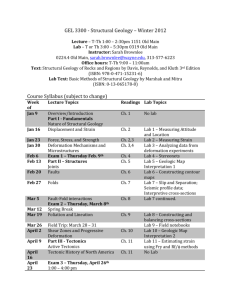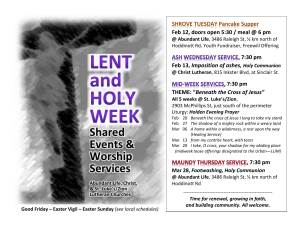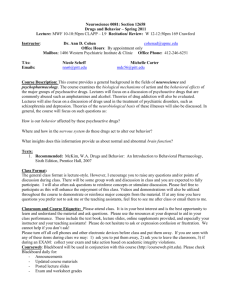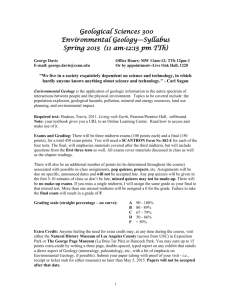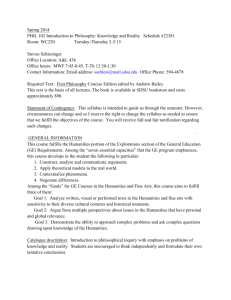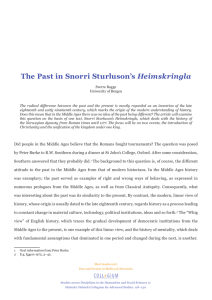Spring 2012 (UW
advertisement
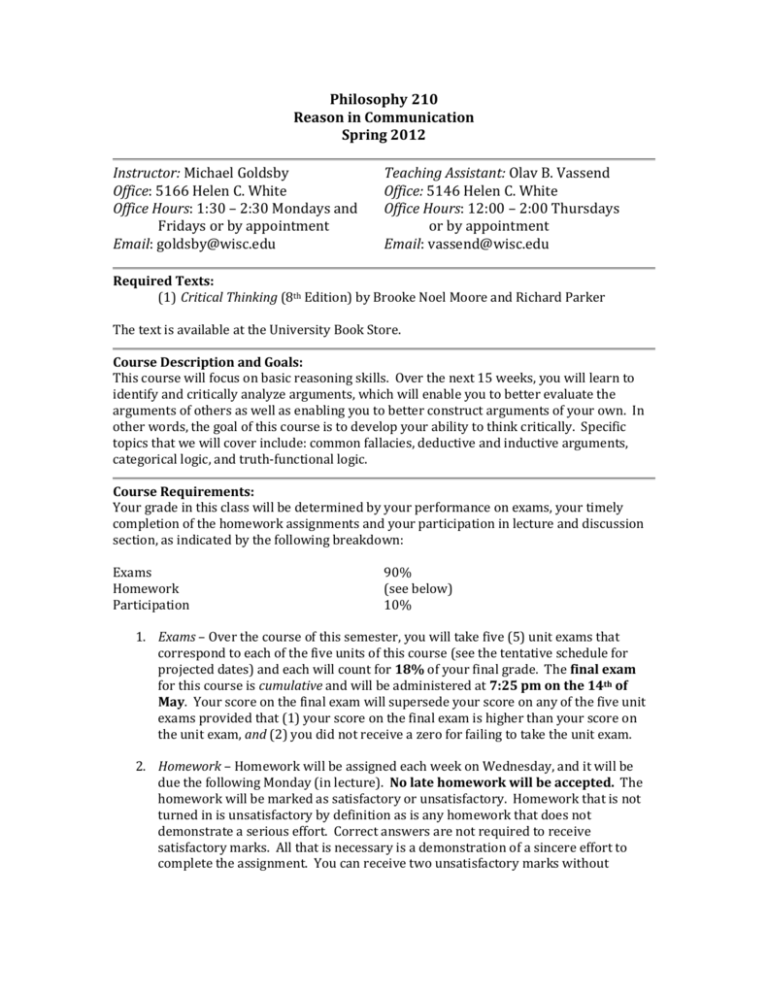
Philosophy 210 Reason in Communication Spring 2012 Instructor: Michael Goldsby Office: 5166 Helen C. White Office Hours: 1:30 – 2:30 Mondays and Fridays or by appointment Email: goldsby@wisc.edu Teaching Assistant: Olav B. Vassend Office: 5146 Helen C. White Office Hours: 12:00 – 2:00 Thursdays or by appointment Email: vassend@wisc.edu Required Texts: (1) Critical Thinking (8th Edition) by Brooke Noel Moore and Richard Parker The text is available at the University Book Store. Course Description and Goals: This course will focus on basic reasoning skills. Over the next 15 weeks, you will learn to identify and critically analyze arguments, which will enable you to better evaluate the arguments of others as well as enabling you to better construct arguments of your own. In other words, the goal of this course is to develop your ability to think critically. Specific topics that we will cover include: common fallacies, deductive and inductive arguments, categorical logic, and truth-functional logic. Course Requirements: Your grade in this class will be determined by your performance on exams, your timely completion of the homework assignments and your participation in lecture and discussion section, as indicated by the following breakdown: Exams Homework Participation 90% (see below) 10% 1. Exams – Over the course of this semester, you will take five (5) unit exams that correspond to each of the five units of this course (see the tentative schedule for projected dates) and each will count for 18% of your final grade. The final exam for this course is cumulative and will be administered at 7:25 pm on the 14th of May. Your score on the final exam will supersede your score on any of the five unit exams provided that (1) your score on the final exam is higher than your score on the unit exam, and (2) you did not receive a zero for failing to take the unit exam. 2. Homework – Homework will be assigned each week on Wednesday, and it will be due the following Monday (in lecture). No late homework will be accepted. The homework will be marked as satisfactory or unsatisfactory. Homework that is not turned in is unsatisfactory by definition as is any homework that does not demonstrate a serious effort. Correct answers are not required to receive satisfactory marks. All that is necessary is a demonstration of a sincere effort to complete the assignment. You can receive two unsatisfactory marks without penalty. However, two percentage points will be taken off of your final grade for each unsatisfactory mark that you receive in excess of two. 3. Participation – Your participation grade will be based on attendance, preparedness, engagement, effort, and attitude in both discussion section and lecture. Olav and I will be keeping track of how well each of you meet these standards in lecture. Olav will provide you with further guidance about the level of participation that he expects in discussion section. Guidelines and Policies: Attendance – Attendance is mandatory for both lecture and discussion section. Failure to attend lecture or discussion section will impact your grade both directly and indirectly. Much of the material in the latter half of this class will most likely be new to you – not to mention difficult – meaning that your likelihood of success decreases with every absence. Furthermore, your participation grade directly depends upon your showing up to class – one cannot participate if one is not present. So, the policy will be that more than two (2) unexcused absences will result in a reduction of your participation grade. Lecture – Our time together is very precious, and as such, I expect you to attend the lectures having read the assigned readings and generally ready to learn. This also means that during class time there should be nothing on your desk that is not required for class (e.g. no newspapers, cell phones, etc.). All cell phones should be silenced and stowed away – that of course means no texting. Laptops may be used for note-taking if you wish, but you should not be checking email, tweeting, facebooking or doing anything else distracting while in lecture. Failure to adhere to these rules will result in a reduction of your participation grade. Discussion Section – Olav and I expect you to attend discussion section and to come prepared. Discussion section is very important as it provides you a smaller venue for getting your questions answered, digesting the material through discussion, getting feedback on your homework and preparing for the exams. You’ll get further instructions from Olav concerning discussion section expectations and policies. Respect in the Classroom – Over the course of the semester, we may discuss some very sensitive issues – ones that may cause your blood to boil. I think J.S. Mill said it best when he said, “there is nothing that offends no one, and no one who is offended by nothing.” It is possible that you may leave lecture very upset about the day’s discussion – good! I hope that I challenge you to think about issues of such import that they would make us angry, sad and wanting to make a change in our lives or the world. However, I expect everyone to treat every other member of this class with the highest degree of respect. Acting otherwise will result in dire consequences for the transgressors. Special Arrangements – Any student who requires special arrangements for attending class or doing assignments must let me know by the end of the second week of class. I will work with the McBurney Center to make any reasonable accommodations. *Changes to this syllabus may be made during the course of the semester. Tentative Schedule The following schedule is subject to change. Week 1: Jan 23 – Jan 27 M – Introduction W – Critical Thinking (pp 1-19) Chapter 1 (claims, arguments, objective vs. subjective); HW1 assigned F – Critical Thinking (pp 39-64) Chapter 2 (definitions, ambiguity, fallacies of composition and division, vagueness, comparisons) Week 2: Jan 30 – Feb 3 M – Critical Thinking (pp 39-64) Chapter 2 (cont.); HW1 Due W – Critical Thinking (pp 117-134) Chapter 4 (rhetorical devices: slanters); HW2 assigned F – Critical Thinking (pp 145-163) Chapter 5 (rhetorical devices: fallacies) Week 3: Feb 6 – Feb 10 M – Critical Thinking (pp 173-189) Chapter 6 (more Fallacies); HW2 Due W – Critical Thinking (pp 173-189) Chapter 6 (cont.); HW3 assigned Friday February 10th Exam 1 Week 4: Feb 13 – Feb 17 M – Critical Thinking (pp 215-226) Chapter 7 (arguments: deductive and inductive, validity, soundness, strong arguments, unstated premises) HW3 Due W – Critical Thinking Chapter 7 (cont.); HW4 assigned F – Critical Thinking (pp 215-226) Chapter 7 (argument structure, evaluating arguments) Week 5: Feb 20 – Feb 24 M – Critical Thinking Chapter 7 (cont.); HW4 Due W – Critical Thinking Chapter 7 (cont.); No homework this week. Friday February 24th Exam 2 Week 6: Feb 27 – Mar 2 M – Critical Thinking (247-257) Chapter 8 (categorical logic, square of opposition) W – Critical Thinking (258-261) Chapter 8 (conversion, obversion, contraposition); HW5 assigned F – Critical Thinking (265-275) Chapter 8 (categorical syllogisms, Venn diagrams) Week 7: Mar 5 – Mar 9 M – Critical Thinking Chapter 8 (Venn diagrams); HW5 Due W – Critical Thinking Chapter 8 (cont.); HW6 assigned F – Critical Thinking Chapter 8 (cont.) Week 8: Mar 12 – Mar 16 M – Critical Thinking Chapter 8 (cont.); HW6 Due W – Critical Thinking Chapter 8 (cont.) Friday March 16th Exam 3 Week 9: Mar 19 – Mar 23 M – Critical Thinking Chapter 9 (pp 287-301) and Logic Reading 1 (introduction to truth-functional logic) W – Logic Reading 1 (logical connectives, conditionals, translations); HW7 assigned F – Logic Reading 1(translations) Week 10: Mar 26 – Mar 30 M – Logic Reading 2 (truth tables) HW7 due W – Logic Reading 2 (truth tables); HW8 assigned F – Logic Reading 3 (truth tables and proofs) Spring Break March 31st – April 8th Week 11: Apr 9 – Apr 13 M – Logic Reading 3 (primitive rules of proofs); HW8 due W – Logic Reading 3(primitive rules of proofs); HW 9 assigned F – Logic Reading 3 (primitive rules of proof) Week 12: Apr 16 – Apr 20 M – Logic Reading 3 (primitive rules of proofs); HW9 due W – No Readings (derived rules) F – No Readings (derived rules); No homework this week Week 13: Apr 23 – Apr 27 M – Truth-functional logic review; HW 10 assigned Wednesday April 25th Exam 4 F – Critical Thinking (pp 333-357) Chapter 10 (inductive generalizations) Week 14: Apr 30 – May 4 M – Critical Thinking Chapter 10 (cont.) (analogical arguments); HW10 due W – Critical Thinking (pp 371-394) Chapter 11 (causal reasoning); HW 11 assigned F – Critical Thinking Chapter 11 (cont.) (mistakes in causal reasoning) Week 15: May 7 – May 11 M – Critical Thinking Chapter 11 (cont) (review and scientific reasoning); HW 11 due Wednesday May 9th Exam 5 F – Review for final Final Exam: Monday May 14th 7:25 pm.


